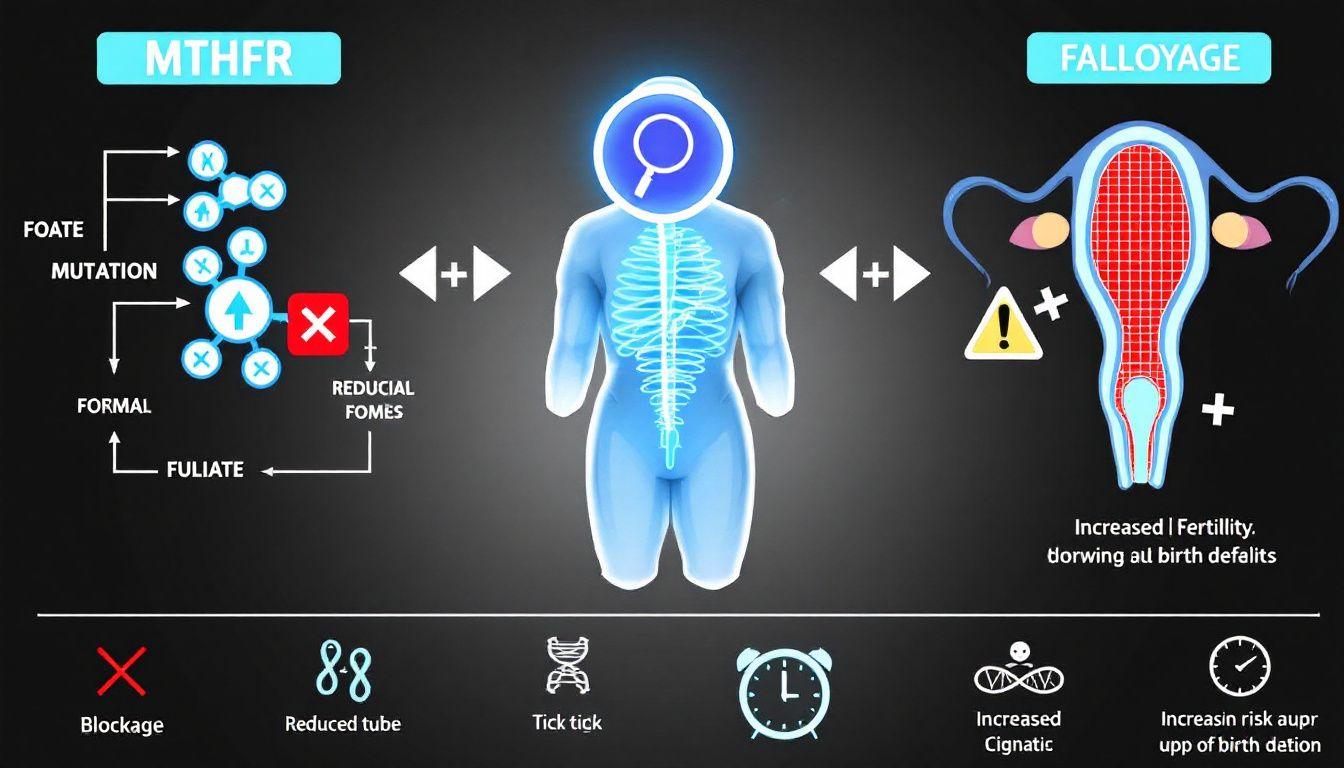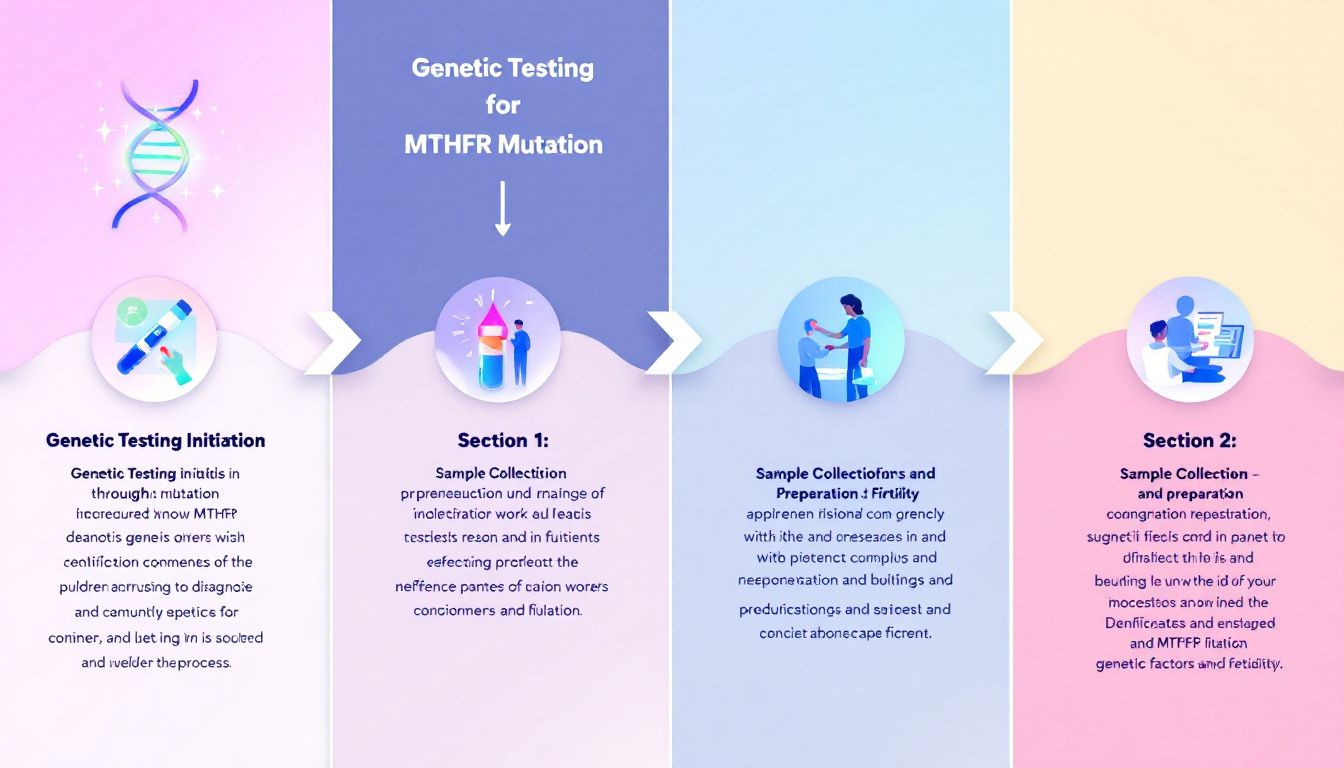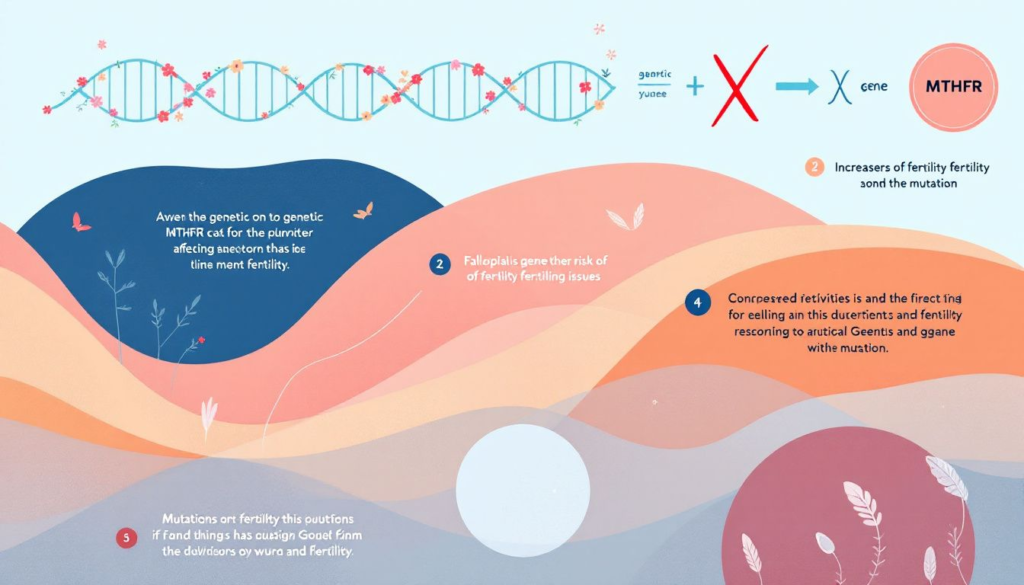Could the MTHFR gene mutation be affecting your fertility? This article explores the link between MTHFR and fertility complications, risks involved, and strategies to manage them.
Key Takeaways
MTHFR gene mutations affect folate metabolism, leading to elevated homocysteine levels and associated fertility complications in both men and women.
Diagnosis of MTHFR mutations typically involves blood tests to assess homocysteine levels, with genetic testing recommended for individuals facing recurrent fertility issues.
Effective management of MTHFR-related fertility issues includes supplementation with methyl folate, dietary adjustments, lifestyle changes, and professional medical guidance.
Understanding MTHFR Gene Mutation

The MTHFR gene mutation refers to a condition that affects the body’s ability to process folic acid and vitamin B9, which are critical for numerous biological functions, including DNA synthesis and repair. The abbreviation MTHFR stands for methylenetetrahydrofolate reductase, an mthfr enzyme that plays a crucial role in folate metabolism. When this enzyme is impaired due to a mutation, it can lead to elevated levels of homocysteine, an amino acid linked to various health issues, including fertility complications.
Approximately 40% of the population has some form of MTHFR gene mutation. This genetic condition can manifest in one of three ways: having one copy of the mutation, having two copies, or having none. Understanding the specifics of these mutations can provide valuable insights into managing related health issues.
Types of MTHFR Mutations
There are two common types of MTHFR gene mutations that are typically tested for: C677T and A1298C. These two specific mthfr variants can affect the enzyme’s ability to function properly, leading to a range of health issues. For instance, having a homozygous mutation, where an individual inherits two copies of the same gene variant, can lead to significantly elevated homocysteine levels. These elevated levels can pose serious health risks, including cardiovascular diseases and fertility issues.
Individuals with two A1298C genes generally do not experience elevated homocysteine levels, but this does not mean they are free from health risks. In contrast, a homozygous mutation involving the C677T variant is more likely to result in elevated homocysteine levels, which can cause more severe health problems.
Understanding these types can help in tailoring specific treatment plans.
Symptoms of MTHFR Gene Mutation
MTHFR gene mutations can manifest in various ways, often making them difficult to diagnose based solely on symptoms. Common symptoms include fatigue and depression, which are frequently associated with MTHFR gene mutations. These symptoms arise because the mutation affects folate metabolism, leading to deficiencies in essential vitamins.
Additionally, individuals with MTHFR gene mutations may experience other health issues such as neural tube defects, chromosomal abnormalities, and elevated homocysteine levels. These complications can further exacerbate underlying health conditions and contribute to fertility challenges.
Genetic testing is often necessary to confirm the presence of an MTHFR gene mutation and to tailor appropriate treatment strategies.
How MTHFR Gene Mutation Impacts Fertility

MTHFR gene mutations can significantly impact fertility by disrupting folate levels, which are essential for DNA regulation and hormone synthesis. Both men and women can face fertility issues due to these mutations.
For men, MTHFR gene mutations can lead to problems with sperm production and motility. For women, low folate levels can cause fetal developmental disorders such as neural tube defects and make it difficult to conceive or maintain a pregnancy.
Effects on Menstrual Cycles
MTHFR mutations can result in irregular menstrual cycles, which in turn affect ovulation. Women with these mutations may find it challenging to predict their ovulation cycles, complicating efforts to conceive. Ovulation is critical for follicular development, and any disruptions can lead to fertility issues.
Moreover, the ovaries may become less responsive to follicle-stimulating hormone during ovulation due to MTHFR mutations. This reduced responsiveness, combined with irregular menstrual cycles, can lead to decreased egg quality, further exacerbating fertility challenges.
Hormonal Imbalances
MTHFR gene mutations are often linked to altered hormone levels, which can disrupt ovulation and lead to fertility complications. These hormonal imbalances can make conception difficult and may also contribute to issues like chromosomal abnormalities and spontaneous abortions.
Addressing these hormonal changes is crucial for improving fertility outcomes.
Risks of Blood Clots
One of the more severe risks associated with MTHFR gene mutations is an increased likelihood of blood clots. Elevated homocysteine levels can lead to thrombosis, significantly increasing the risk of pregnancy complications such as pre-eclampsia and recurrent miscarriages. Blood clots can interfere with implantation and embryonic development, causing further complications.
The risk of blood clots is not limited to one stage of pregnancy; it can occur both early and late in the term. Treatment often includes anticoagulants like heparin or baby aspirin to prevent these complications. However, managing blood clot risks requires ongoing medical supervision.
Elevated homocysteine levels, common in individuals with MTHFR mutations, necessitate treatments such as heparin or baby aspirin to mitigate the risk of blood clots. These treatments are crucial for preventing complications during pregnancy and ensuring a healthier outcome for both mother and child.
Autoimmune Issues
Autoimmune responses triggered by elevated homocysteine levels can complicate pregnancy outcomes for individuals with MTHFR mutations. Conditions such as diabetes, autoimmune diseases, and high blood pressure can cause excess inflammation during pregnancy, leading to fertility issues.
These complications can result in recurrent miscarriages, pre-eclampsia, and chromosomal abnormalities.
Importance of Methyl Folate

Methyl folate plays a crucial role in managing MTHFR gene mutations. These mutations can disrupt folate metabolism, which is vital for reproductive health. Ensuring adequate methyl folate levels can help mitigate fertility issues by supporting DNA regulation and hormone synthesis.
Folic acid supplementation is crucial for those with MTHFR mutations to prevent complications during pregnancy.
Recommended Supplements
Individuals with homozygous MTHFR mutations often require higher levels of methyl folate supplementation. Active forms of folate, such as 5-MTHF, are more readily absorbed by the body compared to synthetic folic acid, making them particularly beneficial for those with MTHFR mutations.
Preconception vitamins containing folate are also recommended to reduce the risk of neural tube defects in pregnancies affected by these mutations. Consulting with a healthcare professional to develop a tailored nutrition plan is highly advisable.
Dietary Considerations
Incorporating natural food sources rich in folate, such as dark leafy greens, legumes, and citrus fruits, can help mitigate fertility issues related to MTHFR mutations. Vegetables high in natural folate, like spinach, okra, and turnip greens, should be staples in the diet. However, foods containing synthetic folate (folic acid), such as enriched grains, should be avoided.
Cooking methods also matter; overcooking can destroy the dietary folate content in foods. Moreover, certain substances like catechin in tea and antacids can inhibit folic acid absorption, so these should be consumed with caution.
Making specific dietary changes and adopting holistic practices can enhance fertility and overall health.
Lifestyle Adjustments
Lifestyle choices significantly impact individuals with MTHFR mutations. For instance, alcohol consumption interferes with folate metabolism, leading to increased homocysteine levels. Reducing alcohol intake can lower these levels and improve overall health. Quitting smoking is also crucial, as tobacco increases the risk of complications associated with MTHFR gene mutations.
Regular physical activity not only improves overall health but also helps mitigate the risks associated with high homocysteine levels. Exercise reduces stress and enhances fertility, making it an essential part of managing MTHFR gene mutations. Those starting a new exercise routine should begin slowly and consult with a doctor.
Diagnosing MTHFR Gene Mutation

Diagnosing an MTHFR gene mutation typically involves a blood test to identify common gene changes linked to elevated homocysteine levels. Genetic testing is often recommended for couples facing recurrent pregnancy losses or other fertility complications.
Understanding your MTHFR status can provide valuable insights into managing related health issues and improving fertility outcomes.
When to Get Tested
Testing for MTHFR mutations is advisable if a blood test reveals elevated homocysteine levels. Elevated homocysteine levels can indicate the need for a genetic test. Couples facing fertility issues or complications during pregnancy should consider testing for MTHFR mutations.
Additionally, those who have experienced recurrent miscarriages or are planning for pregnancy should undergo testing.
Interpreting Test Results
Interpreting MTHFR gene mutation test results involves determining whether an individual has a heterozygous or homozygous mutation. A homozygous mutation generally poses a higher risk for health complications, including those affecting fertility. Elevated homocysteine levels resulting from these mutations indicate the need for monitoring and potential medical intervention.
Consulting healthcare professionals for personalized guidance based on MTHFR status is essential.
Managing Fertility with MTHFR Gene Mutation

Managing fertility with MTHFR gene mutations involves understanding and addressing folate deficiency. Monitoring and managing blood sugar levels can significantly improve fertility outcomes.
Utilizing resources like customized fertility optimization plans and specialized clinics can provide tailored health solutions that address MTHFR-related issues.
Medical Treatments
Medical treatments for individuals with high homocysteine levels due to MTHFR mutations include folate, B vitamins, and anti-clotting medicines like heparin or baby aspirin.
These treatments are crucial for improving fertility outcomes and addressing health complications.
Natural Approaches
Natural approaches to managing fertility with MTHFR gene mutations include lifestyle changes such as improving diet and incorporating physical activity. Regular exercise enhances overall health and reduces the risk of complications. Holistic practices like acupuncture can help reduce stress and improve fertility outcomes.
Combining dietary changes, regular exercise, and holistic practices creates a supportive environment for fertility.
Support and Resources
Support and resources are vital for effectively managing MTHFR-related fertility issues. Customized tests, supplements, and professional guidance can help navigate these challenges more effectively.
A fertility optimization plan can offer tailored solutions to improve fertility outcomes.
Professional Guidance
Consulting healthcare professionals provides critical guidance for individuals navigating the complexities of MTHFR mutations. These practitioners can develop personalized treatment plans tailored to individual concerns. Understanding the intricacies of MTHFR is vital for effective fertility management, and healthcare providers can facilitate this process.
Ongoing support from healthcare professionals enhances the ability to address fertility issues associated with MTHFR mutations.
Community Support
Community support can offer invaluable emotional support and shared experiences for those facing fertility challenges due to MTHFR gene mutations. Joining dedicated support groups allows individuals to connect with others who are navigating similar issues, providing a sense of solidarity and comfort.
These groups can be a source of practical advice, encouragement, and emotional support, helping individuals manage the complexities of their condition more effectively.
Summary
Understanding the impact of MTHFR gene mutations on fertility is crucial for anyone facing related challenges. These mutations can lead to a variety of complications, from irregular menstrual cycles and hormonal imbalances to increased risks of blood clots and autoimmune issues. Managing these complications involves a combination of medical treatments, lifestyle adjustments, and dietary considerations, all aimed at optimizing folate metabolism and overall health.
By seeking professional guidance and leveraging community support, individuals can better navigate the complexities of MTHFR gene mutations. Comprehensive care plans, tailored to individual needs, can significantly improve fertility outcomes and overall well-being. Embracing both medical and natural approaches ensures a holistic strategy for managing this genetic condition, ultimately leading to healthier pregnancies and improved quality of life.
Frequently Asked Questions
What is the MTHFR gene mutation?
The MTHFR gene mutation affects how the body processes folic acid and vitamin B9, leading to potential issues with DNA synthesis and repair. Understanding this mutation is essential for managing related health concerns.
How do MTHFR gene mutations impact fertility?
MTHFR gene mutations can negatively affect fertility by disrupting folate levels, causing irregular menstrual cycles and hormonal imbalances, and increasing the risk of blood clots. Addressing these issues is crucial for improving reproductive health.
What are the symptoms of MTHFR gene mutations?
MTHFR gene mutations commonly result in symptoms such as fatigue, depression, and elevated homocysteine levels, potentially leading to serious health issues like neural tube defects. It is crucial to address these symptoms promptly to mitigate their impact on health.
When should I get tested for MTHFR gene mutations?
You should get tested for MTHFR gene mutations if you have elevated homocysteine levels, recurrent miscarriages, or are planning for pregnancy. These factors can significantly impact your health and may warrant further investigation.
What treatments are available for managing MTHFR-related fertility issues?
To effectively manage MTHFR-related fertility issues, it is crucial to consider treatments like folate and B vitamin supplements, anti-clotting medications such as heparin, along with essential lifestyle changes including a healthier diet and regular exercise. These approaches can significantly enhance fertility outcomes.


